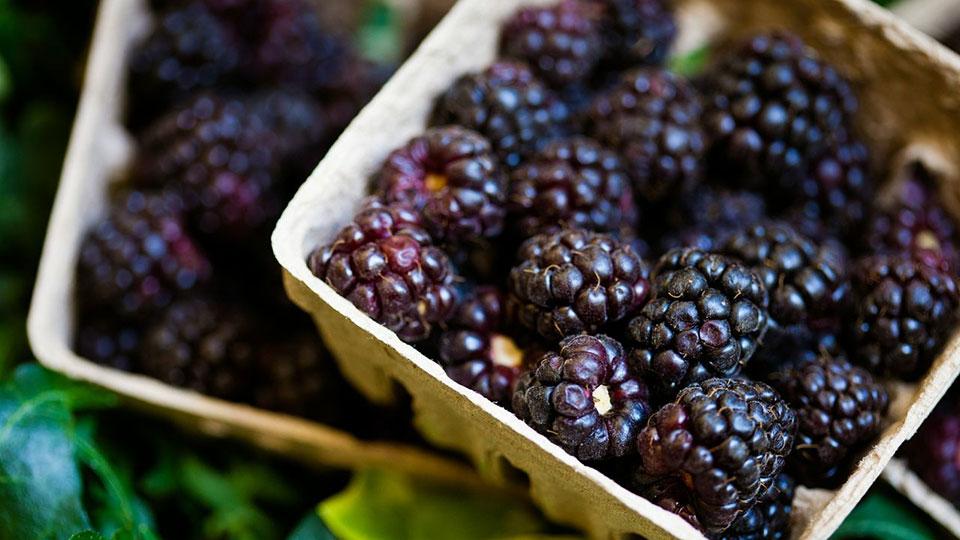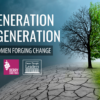On April 28th, Berry Good Food’s eighth Future Thought Leaders panel discussion tackled climate change and its effects on our agriculture and our health with a panel of five experts, moderated as always by BGF founder Michelle Ciccarelli Lerach, at United Portuguese Hall in Point Loma, San Diego. Watch the video.
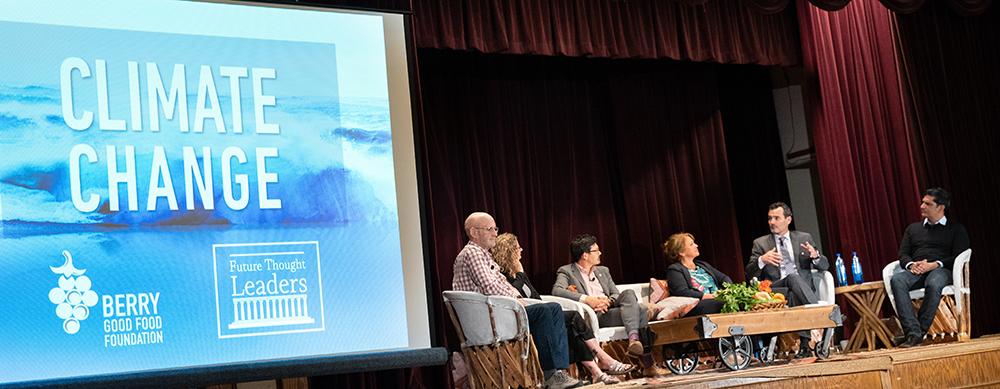
(Photo: Melissa Jacobs)
While many people think the answer to fighting climate change might be investing in solar panels or electric cars (though these are important steps forward), recent indicators point to changing our food system as the best hope for a more sustainable path for the environment.
“We are finally getting to a consensus in major scientific papers in the last several months that are all saying we have to change our diets to avoid climate change,” said David A. Cleveland, a research professor at UC Santa Barbara. “If we don’t decrease or remove animal proteins and processed foods from our diet, we don’t have a chance.”

Special thanks to Chef Andrew Bent of Lola 55 and Chef Davin Waite of Wrench & Rodent Seabasstropub for providing a delicious offering of local and sustainable food. (Photo: Melissa Jacobs)
While the panel did not condone eliminating eating meat altogether, Cleveland went on to say that the current system for meat production is very inefficient from a thermodynamic point of view. “There are 7 billion humans. Every year we slaughter more than 100 billion animals,” said Cleveland. “Eighty percent of the world’s agricultural land is used for animal production. Thirty percent of crops grown in the world are fed to animals.” [Read/watch more about this topic with our “Meaty Issues” panel in 2016.]
Climate change has affected agriculture in three major ways:
- Rising carbon dioxide levels, which cause global warming
- Rising temperatures, which make it harder for plants to grow, make crops mature faster and provide less time for a high yield, and increase stress (walnut and sweet cherry crops may no longer be able to grow in California soon)
- More frequent occurrences of extreme weather like fire, floods, and drought
Rahoul Mehra—whose company Naesscent is developing nontoxic mosquito, tick and bedbug repellents—pointed out that this increase in temperature and moisture creates a virulent breeding ground for stronger pests that will continue to become more resistant to chemical pesticides. “With insects, you want a targeted approach that is species-specific,” said Mehra. “For example, we can take out a mosquito without undermining butterflies, bees, and dragonflies. The ‘toxicity’ we’re using is plant-based, so it is highly toxic to an individual species without increasing resistivity.”
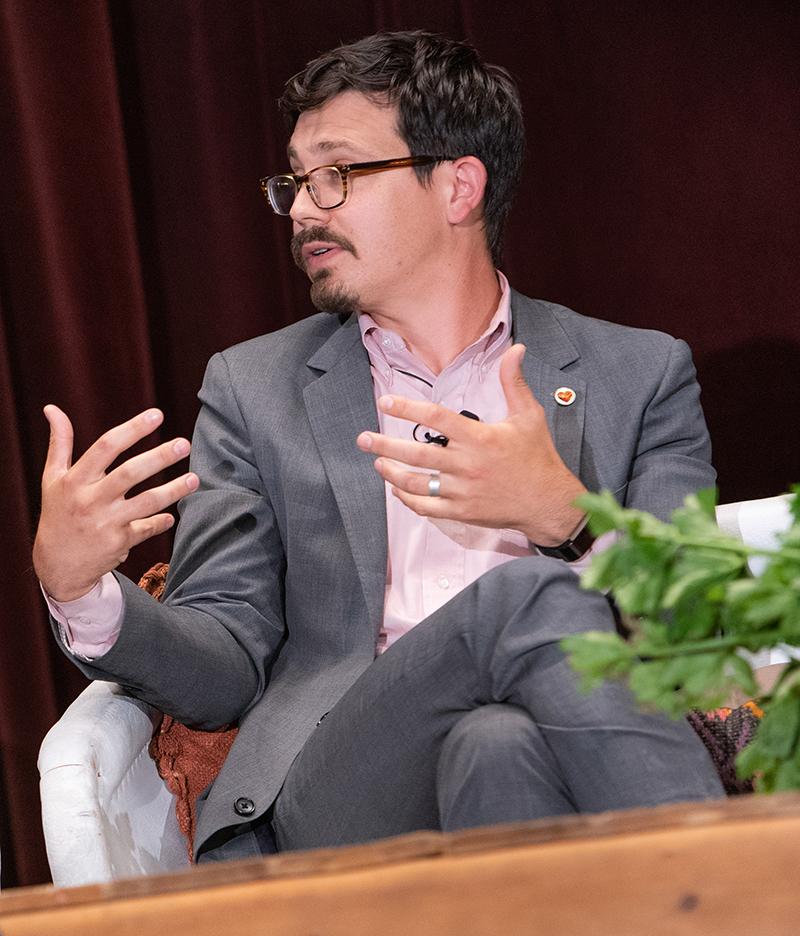
“Send the right signals to politicians about what we want to see,” said panelist Paul Towers (Photo: Melissa Jacobs)
Paul Towers, who supports California family farms and sustainable food systems through policy advocacy and on-the-ground programs, added that due to the increased use of chemical inputs, there is 1 to 2 percent of the original good topsoil left in California. “We have fundamentally dipped into the reservoir of our soil health,” said Towers. “These fertilizer and pesticide brands are manufactured by four major corporations. How do we build up enough political pressure to counterbalance that influence?”
“The food industry successfully sets up systems with the government to portray them as safe when in truth they are protecting themselves,” agreed Rahoul Mehra.
“We’re losing four farms a day in California,” continued Towers. “Politically, decision makers are not getting enough signals from folks that they need to take leadership on this issue. There is no food and farming caucus in the state legislature, but we are working on changing this. There is a new initiative to add a few dollars on your restaurant bill to go toward farmers doing the right thing with their soil. Send the right signals to politicians about what we want to see.”
“Another movement is biomimicry, which is what we can learn from nature to develop technology that would benefit us,” said Dimitri Deheyn, an associate researcher at the Scripps Institution of Oceanography. “Big corporations can begin to have Directors of Biomimicry on their boards, make compounds that are fully biodegradable and technologies that will keep the biodiversity, but still keep it attractive for business.”
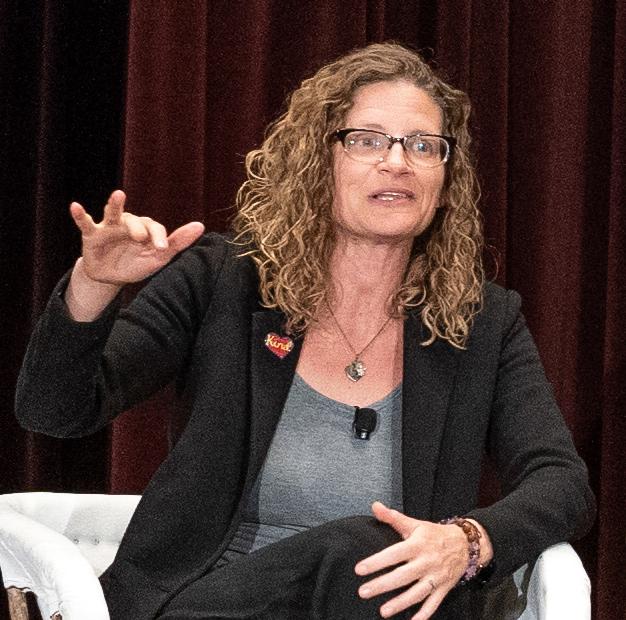
“Unless you have an aquifer on your property, you’re getting drinking water that has been processed to minimize pesticides, anti-depressants, bleach and more,” said panelist Kelli Gray-Meisner (Photo: Melissa Jacobs)
“Our microbiome is like our soil,” said Kelli Gray-Meisner, a registered dietitian nutritionist whose work focuses on the gastrointestinal tract. “We don’t have integrated farms anymore [animals and plants], and now there are too many mono-crop farms. The biodiversity has been removed and they have to pump in synthetic fertilizers and nutrients, which displaces the micronutrients already present in the soil. So how do we keep our microbiome resilient? Eat a variety of plant species, and as much as possible organic and regenerative. The fiber in those fruits, vegetables and grains will pull the things out of our system that we don’t want. Also: vote to create the change you want to see.”
Things You Can Do Today to Slow Down Climate Change
EAT LESS MEAT AND DAIRY Greenhouse gas emissions caused by conventional animal agriculture wreak havoc on our environment. If you must buy meat and dairy, buy from sustainable producers who are following the best practices.
EAT LOCAL AND ORGANIC Support local farmers, cut down on greenhouse gases caused by food transport, and avoid synthetic pesticides sprayed on conventional food that support pharmaceutical and agricultural conglomerates (think Dow, DuPont and Monsanto).
REDUCE FOOD WASTE Only buy what you need in the short term; learn to cook with the whole plant or animal; store food correctly to maximize shelf life; learn to preserve excess produce; save, share or freeze leftovers; keep your refrigerator organized to avoid food being “out of sight, out of mind.”
SUPPORT REGENERATIVE AGRICULTURE Compost at home, grow your own food, become a soil advocate, or support a farmer to be trained in regenerative agriculture.
CLEAN UP YOUR COMMUTE Take public transit, ride a bike, car share, switch to an electric or hybrid vehicle, fly less (or offset your emissions).
GET HOME HEALTHY Change to energy-efficient light bulbs; unplug computers, TVs and other electronics when not in use; wash clothes in cold or warm (not hot) water; hang dry your clothes; look for the Energy Star label when buying new appliances; winterize your home to prevent heat from escaping; get a home or workplace energy audit to identify where you can make the most energy-saving gains; invest in renewable energy like solar panels; reduce your water usage and plant drought-tolerant landscaping.
DIVEST FROM FOSSIL FUELS Meet with your bank or investment adviser to make sure your investments do not include and support fossil fuels.
VOTE, VOTE, VOTE Many politicians deny the existence of man-made climate change and are influenced by fossil fuel lobbyists when passing legislation. Elect local and federal officials who understand that climate change is real, it’s a crisis, and we want change now.
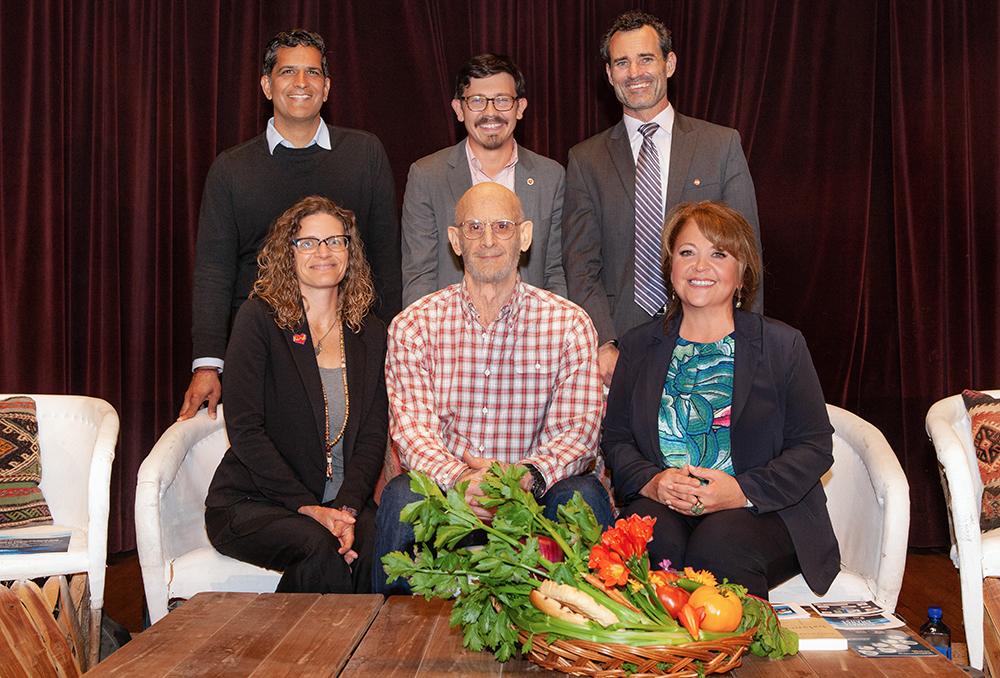
Thank you to our panelists! Back row, L to R: Rahoul Mehra, Paul Towers, Dimitri Deheyn. Front row: Kelly Gray-Meisner, David A. Cleveland, Michelle Ciccarelli Lerach. (Photo: Melissa Jacobs)
“Climate Change” panelists:
- David A. Cleveland: Research Professor, Environmental Studies Program and Department of Geography, University of California, Santa Barbara
- Dimitri Deheyn: Associate Researcher, Marine Biology Research Division, Scripps Institution of Oceanography, University of California, San Diego
- Kelli Gray-Meisner: Registered Dietitian Nutritionist, Center for Integrative Medicine, UC San Diego School of Medicine
- Rahoul Mehra: Founder and CEO, Naesscent LLC
- Paul Towers: Executive Director, Community Alliance with Family Farmers
- Michelle Ciccarelli Lerach: Moderator and Founder of Berry Good Food
Catch up on all of our Future Thought Leaders panel discussions here.
